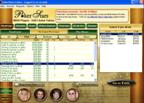
Lessons from the Pro Poker Tour
A Lesson in Expected Value from Deal or No Deal
While expected value (EV) should be a critical component of any poker player’s analysis, I am going to argue that it should not be the sole criteria – especially in tournament poker.
I think David Apostolico is the author of 'Machiavellian Poker Strategy', and 'Tournament Poker and The Art of War,' and his latest title 'Poker Strategies for a Winning Edge in Business.' David's website is www.holdemradio.com/blog/ a good way of looking at this is to use the game show Deal or No Deal © as an example. For those not familiar with the show, each contestant picks one case out of a total of about 30 cases. Each case contains a dollar amount of money from $1 to $1,000,000. The contestant’s case is opened last. The contestant then starts picking other cases to be opened. As each case is opened, the EV of the contestant’s case will go up or down depending on what is revealed. For instance, if 15 cases can be eliminated and most of them are in the $1- $10,000 range leaving cases such as the $1,000,000 still in play, than the greater the chance that the contestant holds a case with big money. There is a banker on the sidelines who is willing to pay the contestant for her case depending on the perceived EV. The banker will make offers at selected intervals so the EV at the beginning will not be a lot since there are so many cases left. However, if the contestant is fortunate enough to eliminate most of the smaller cases, her EV will go up dramatically and so will the bid from the banker.
David Apostolico is the author of 'Machiavellian Poker Strategy', and 'Tournament Poker and The Art of War,' and his latest title 'Poker Strategies for a Winning Edge in Business.' David's website is www.holdemradio.com/blog/ a good way of looking at this is to use the game show Deal or No Deal © as an example. For those not familiar with the show, each contestant picks one case out of a total of about 30 cases. Each case contains a dollar amount of money from $1 to $1,000,000. The contestant’s case is opened last. The contestant then starts picking other cases to be opened. As each case is opened, the EV of the contestant’s case will go up or down depending on what is revealed. For instance, if 15 cases can be eliminated and most of them are in the $1- $10,000 range leaving cases such as the $1,000,000 still in play, than the greater the chance that the contestant holds a case with big money. There is a banker on the sidelines who is willing to pay the contestant for her case depending on the perceived EV. The banker will make offers at selected intervals so the EV at the beginning will not be a lot since there are so many cases left. However, if the contestant is fortunate enough to eliminate most of the smaller cases, her EV will go up dramatically and so will the bid from the banker.
Let’s look at a few examples to see how relevant EV is. Say you are a contestant on the show and after you pick your case, your EV is $10,000. The banker offers you $20,000. From an EV point of view, this is a fantastic offer. Yet, I would bet that 99% of us would reject the offer. Why? Because we want to take a chance at some big money. How often do you get that chance on a game show? $20,000 is not going to make much of a difference in your lifestyle. We’re willing to gamble a little bit here because there is some huge potential upside.
Now, let’s say you are down to the final two cases. There is a case of $1 and a case of $1,000,000. Your EV is approximately $500,000. The banker offers you $490,000. I would be willing to bet that the great majority of us would accept the banker’s deal even though it is a negative EV deal. Why? Because $490,000 is a lot of money that can make a big difference in most of our lives. More importantly, most of us are not willing to risk going home with $1 at this point when we can be guaranteed $490,000. We don’t like to gamble that much.
No matter what the EV is in poker, there is a lot of luck. That’s why there are certain stages of the tournament when it makes sense to gamble and certain times that it does not. If you are getting close to the big money, why take a chance in getting busted out just because you have positive EV to call? Conversely, if you have a huge stack and have the opportunity to eliminate a short stack (in a hand that’s a negative EV play) and move up in the money, it may be worth doing. If it’s time for a deal and you can get some guaranteed big money at a slightly negative EV, don’t completely rule it out if that money is meaningful. Anything can happen in poker.
In a lot of these examples, you can even argue that EV is a fluid concept and not absolute. For instance, what are the odds that you will be on a game show like Deal or No Deal? If you factor that in, than that original $20,000 positive EV that we would all reject may in fact be a negative EV after all.

